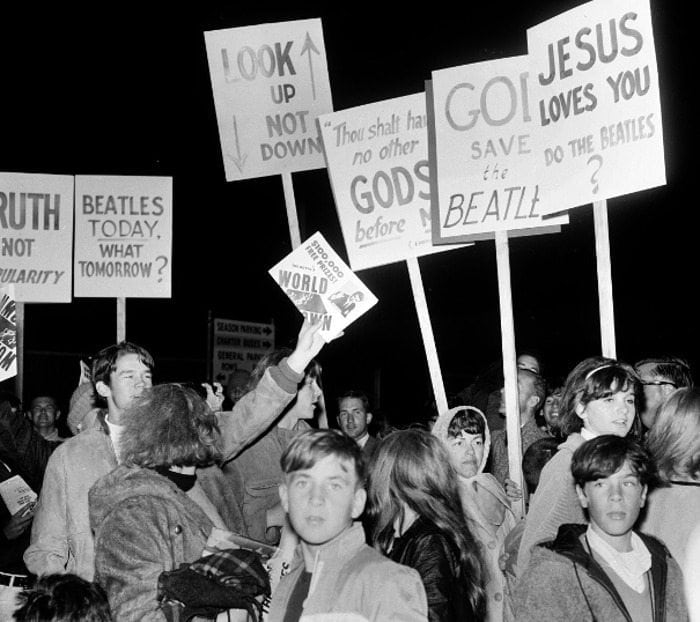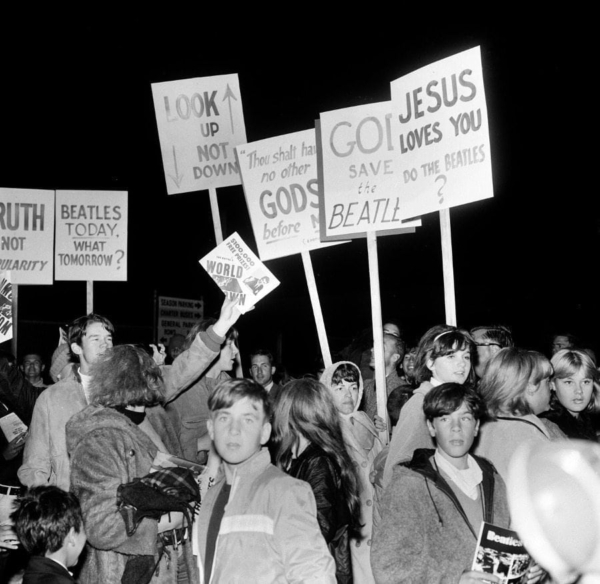Estimated reading time is 6 minutes.
FACEBOOK GETS MY ATTENTION in the early morning hours as I sip my coffee and wait for that part of my brain/mind that ratiocinates to kick into gear. I scroll through my timeline and when an interesting image catches my attention, I read it, and sometimes chime in. I try to be positive and humorous: yesterday I made a somewhat silly comment on someone’s Facebook page and I coined a word that somehow related in some way to the original post: ‘sacrilitigious.’
It is, of course, a play on the words sacrilegious and litigious and no doubt the Facebook post had something to do with something related to religion or faith.
With me, it could have been inane Rep*blican politics, which is as close to an act of faith as most Americans get in a culture that worships religion but fears and loathes spirituality.
And throughout the day that silly word kept popping back in my head. So here I am with it today . . .
Nietzsche’s title was Die Fröhliche Wissenschaft and was first translated into English as The Joyous Wisdom. But The Gay Science has become the common translation since Walter Kaufmann’s enormously popular translation of 1960.
What does the dictionary say?
According to the ever-trust Merriam-Webster, the word sacrilege means:
• an act of treating a holy place or object in a way that does not show proper respect
• a technical and not necessarily intrinsically outrageous violation of what is sacred because consecrated to God
• gross irreverence toward a hallowed person, place, or thing
Also courtesy of Merriam-Webster we have litigious, which means:
• too ready or eager to sue someone or something in a court of law
• tending or likely to engage in lawsuit
Arriving at a definition for sacrilitigious
If I combine aspects of the definitions above, I could arrive at several options for sacrilitigious:
• the act of suing someone in a court of law over an intrinsically outrageous violation of what is considered sacred
• ready to sue someone in a court of law as a gross irreverence toward a hallowed person, place, or thing
Either way, we are looking at a word that means taking someone to court—something that takes place in consensual (shared) reality and is empirically verifiable—over an action, statement, writing, records, etc., that the plaintiff considers an assault on his religious beliefs.
That is his belief in something that is not a part of consensual reality and cannot be verified empirically.
So, sacrilitigious is about one person suing another or having another person prosecuted for committing a crime against his faith.
It happens elsewhere and it could happen here . . .
Debatably sacrilitigious writing
In 1882, German philosopher, cultural critic, poet, composer, and Latin and Greek scholar Friedrich Wilhelm Nietzsche alerted the world to the fact that God was dead. And I will leave this topic to the experts:
“The meaning of the phrase [God is dead] is often misunderstood—many have interpreted that Nietzsche believed in a literal death or end of God. Instead, the line points to the western world’s reliance on religion as a moral compass and source of meaning. As he explains in The Gay Science:
‘God is dead. God remains dead. And we have killed him. How shall we comfort ourselves, the murderers of all murderers? What was holiest and mightiest of all that the world has yet owned has bled to death under our knives: who will wipe this blood off us?
What water is there for us to clean ourselves? What festivals of atonement, what sacred games shall we have to invent? Is not the greatness of this deed too great for us? Must we ourselves not become gods simply to appear worthy of it?’
Nietzsche’s works express a fear that the decline of religion, the rise of atheism, and the absence of a higher moral authority would plunge the world into chaos. The western world had depended on the rule of God for thousands of years—it gave order to society and meaning to life.
Without it, Nietzsche writes, society will move into an age of nihilism. Although Nietzsche may have been considered a nihilist by definition, he was critical of it and warned that accepting nihilism would be dangerous.” (Philosophy Index)
In the 19th century, the idea of taking an author to court for anything other than libel was probably never entertained. Today, Friedrich might be hauled before a jury of his peers—and Hah! on finding peers for Nietzsche—and taken to the cleaners through sacrilitigation!
Datebook (cover-dated September 1966): “I don’t know which will go first—rocknroll or Christianity.” And all hell broke loose upon the land and the Righteous among us who helped the Lord smote thousands of Beatles records. 1
Debatably sacrilitigious speaking
In March 1966, the London Evening Standard ran a series of articles entitled “How Does a Beatle Live?” They featured interviews with George Harrison, John Lennon, Paul McCartney, and Ringo Starr by journalist Maureen Cleave. She had interviewed the Fab Four regularly for several years. John famously stated:
“Christianity will go. It will vanish and shrink. I needn’t argue about that. I’m right and I’ll be proved right. We’re more popular than Jesus now. I don’t know which will go first, rock and roll or Christianity. Jesus was all right, but his disciples were thick and ordinary. It’s them twisting it that ruins it for me.”
And nothing happened.
In England.
In July 1966, nearly five months after UK publication and no one having said anything anywhere about John’s restatement, Datebook published the interviews in the US. In Birmingham, Alabama, a disc-jockey named Tommy Charles heard about the quotation and broadcast it on his show.
He asked listeners to phone in the response was overwhelmingly negative: “We just felt it was so absurd and sacrilegious that something ought to be done to show them that they can’t get away with this sort of thing.”
In 1966, this led to bonfires consuming old Beatles records and pictures and magazines and trinkets. Most of this happened in the southern states—where all the exciting things take place.
Today, in a world where the Supreme Court has ruled that the sitting President of the United States can be sued by private individuals and organizations with a political ax to grind, no doubt all four of the Beatles would have been subpoenaed. 2

Critic Lucy R. Lippard opined that Piss Christ is “a darkly beautiful photographic image. The small wood and plastic crucifix becomes virtually monumental as it floats, photographically enlarged, in a deep rosy glow that is both ominous and glorious.”
Debatably sacrilitigious art
Piss Christ is a photograph by Andres Serrano depicting a plastic crucifix in a glass of yellow fluid—supposedly the artist’s urine. The photo was one of the winners of the Southeastern Center for Contemporary Art’s Awards in the Visual Arts. And it created a brouhaha still felt by artists to this day.
Many people who are not involved in the contemporary art world found Andres Serrano’s photograph Piss Christ to go beyond the boundaries of taste and border on sacrilegious. Actually, it’s a rather striking image and might have been seen in a very different light if the artist had named it, say, Behold The Man, and only let a few friends in on the source of the gold low.
But, alas, he did not . . .
And the moral of this story is?
The next time you feel the urge to say or do or write or paint or photograph something that might offend someone else’s faith-based perspective on what is proper and allowable, you might want to consider whether that someone might find your something sacrilitigious . . .
HEADER IMAGE: Hell hath no fury like that of a righteous American christian teenager. Apparently, this photo was taken outside of Candlestick Park in San Francisco on August 29, 1966, as the Beatles were performing one of their last converts inside. Many of these kids grew up only to have their own children seduced by the Devil through the backmasking of satanic messages in heavy metal records in the ’90s.
FOOTNOTES:
1 Of course, this was before God invented used record stores. Had they been around these kids could protested by swapping their old Beatles records for new Monkees records . . .
2 And since the subpoenas would have coincided with the group’s decision to give up touring, we would still be blaming that damn DJ and those dumb christian kids for turning the Beatles way from our stores and our concert halls!
Mystically liberal Virgo enjoys long walks alone in the city at night in the rain with an umbrella and a flask of 10-year-old Laphroaig who strives to live by the maxim, “It ain’t what you know that gets you into trouble; it’s what you know that just ain’t so.
I’ve been a puppet, a pauper, a pirate, a poet, a pawn, and a college dropout (twice!). Occupationally, I have been a bartender, jewelry engraver, bouncer, landscape artist, and FEMA crew chief following the Great Flood of ’72 (and that was a job that I should never, ever have left).
I am also the final author of the original O’Sullivan Woodside price guides for record collectors and the original author of the Goldmine price guides for record collectors. As such, I was often referred to as the Price Guide Guru, and—as everyone should know—it behooves one to heed the words of a guru. (Unless, of course, you’re the Beatles.)








